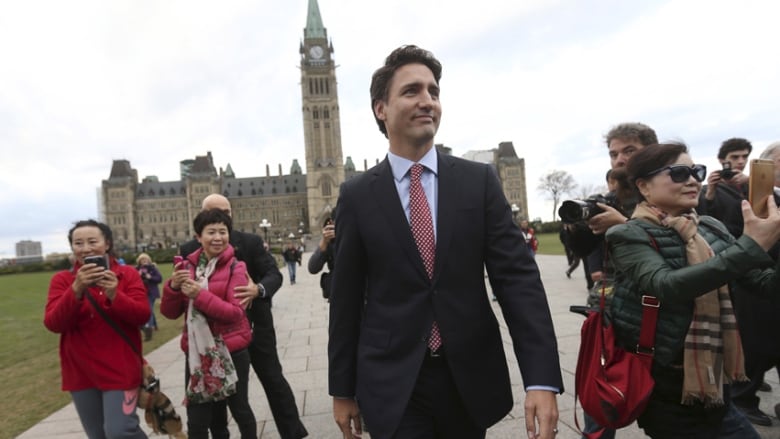Will Trudeau destroy the first-past-the-post ring of power?
Electoral reform would make minority governments and associated co-operation the norm, Alon Weinberg writes

"One ring to rule them all and in the darkness bind them." J.R.R. Tolkien, Lord of the Rings
As many Canadians breathed a great sigh of relief at the end of the Conservative government, progressive and democratically active citizens hoped for a minority government in Canada.
Why a minority? Minority governments require co-operation across party lines to pass laws, with no single party holding a majority of seats. After years of uncompromising hyper-partisanship in Ottawa, there was a sense that Canadians would be better served by multiple parties collaborating.
- Trudeau unlikely to change voting system, say political scientists
- Going deeper into Canada's 2015 federal election results
The Liberal electoral result indicates a decisive vote against the Harper government. But while the Liberals have won a parliamentary majority, the popular vote nationally shows they did not obtain a majority of votes; a majority of Canadians voted for candidates of parties other than the Liberal Party of Canada.
Their percentage of the popular vote was 39.5 per cent, 0.1 per cent less than the Harper government's share of the popular vote in 2011, at 39.6 per cent, and 1 per cent less than NDP premier Rachel Notley's share of the popular vote in Alberta, at 40.5 per cent. In both the Harper and Trudeau majorities, their respective parties won 54 per cent of the seats, 15 per cent above the proportion they deserve. In Alberta the distortion was even greater, as the NDP won 64 per cent of the seats. Canadians from all sides of the political spectrum have now felt the sting of our electoral system.
All three of these governments can be called "false majorities," a result typical of our first-past-the-post (FPTP) elections. FPTP is an archaic hangover from our British-downloaded democratic system, sensible only when two parties are running. The Trudeau fake majority is now the 17th majority government in Canada since the First World War, but only four times did the governing party actually capture a majority of votes.
1 winner, several losers
In an ideologically and geographically diverse country like Canada, FPTP makes little sense. Election results fail to reflect differences in party positions, as only the votes cast for the winner of each individual riding count towards representation. Regardless of the margin of victory, the system produces one winner and several losers.
The strategic voting of this election, while pragmatic, caused a distortion of our deeper ideological values. Basic policy differences among the Liberals, NDP and Greens were glossed over in the ABC (Anyone But Conservative) movement. Polls played an exaggerated role in determining voting intentions. It seems voters gravitated to the party they thought could win the election, producing less mixed results than Canadians may have sought.
With results skewed nationally, more skewed is the discourse itself on the basis of parties appealing to a mushy-middle biggest bloc of votes. Economically, the Mulcair NDP headed straight for the centre, leaning to the austere right, in an effort to court Conservative voters, and the Liberals did a fiscal shift, promising deficits to woo the left.
We have alternatives. In a proportional electoral system where every vote cast is represented through seats in Parliament (usually above a certain threshold of three to five per cent), parties can stand on their principles and see that every vote cast for them is a vote FOR their positions and not simply AGAINST the governing party.Furthermore, rather than producing one winner and several losers, a proportional system rarely produces majority governments, requiring legislative power to be negotiated between two or more parties, rather than won totally.
Absolute power corrupts
So, will Trudeau follow through on his election promise to make 2015 the last unfair election in Canadian history now that he commands a majority?
In Tolkien's Lord of the Rings, the "one ring" that rules all others is found and a council of "the good" is convened to decide what to do with it. The wizard Gandalf decides that though he has good intentions for Middle Earth, he should not wield the ring, for it could overcome his will and drive him to do things he otherwise opposes. Absolute power corrupts absolutely. It is decided that the ring must be destroyed.
Trudeau has said he will do politics differently, including reducing the power of the Prime Minister's Office (PMO). While this reform would be most welcome, the deeper structural knot holding back democracy is our electoral system. Now that Trudeau holds the majority government "Ring of Power," will he forget his promise of electoral reform, tempted to wield an unstoppable power and enact his party's agenda upon the land, while most voters did not vote for his party? Or will he follow Gandalf's wisdom and strike a blow against the absolute, undemocratic power namely, do away with the first-past-the-post system once and for all?
It's up to us citizens to not exhale our relief at being done with one government's dominance and watch passively while another's takes root. We need to push electoral reform to the top of the new government's priority list. It's time for every vote to count in Canada towards representation, and for laws to be negotiated through compromise and co-operation, rather than unilaterally.
Alon Weinberg is a former candidate of the Green parties of Manitoba and Canada, but currently belongs to no political party. He is communications chair for the newly formed Fair Vote Manitoba, a chapter of Fair Vote Canada.












_(720p).jpg)


 OFFICIAL HD MUSIC VIDEO.jpg)
.jpg)



























































































